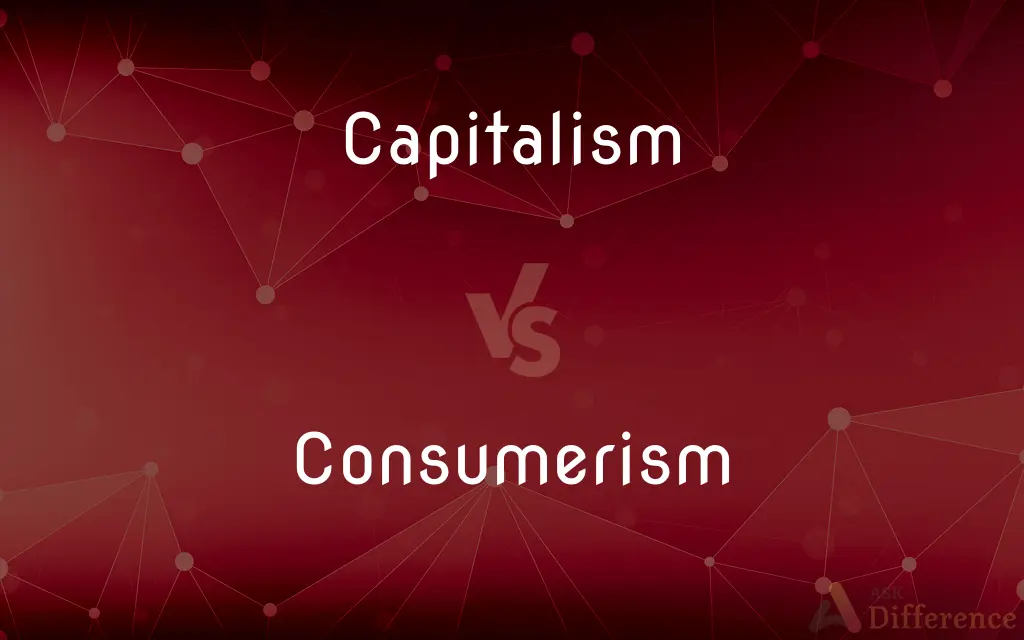Capitalism vs. Consumerism — What's the Difference?
By Fiza Rafique & Urooj Arif — Updated on March 20, 2024
Capitalism is an economic system based on private ownership and free markets, while consumerism is a social and economic orders. Capitalism focuses on production and investment, consumerism on consumption and acquisition.

Difference Between Capitalism and Consumerism
Table of Contents
ADVERTISEMENT
Key Differences
Capitalism is characterized by private property, capital accumulation, wage labor, voluntary exchange, a price system, and competitive markets. In this system, the decisions regarding investment, production, and distribution are based on market signals and the interactions of buyers and sellers. Whereas consumerism emphasizes the consumption of goods and services at high volumes, often beyond individuals' basic needs. It is marked by a cultural attitude that values excessive purchasing and spending as a route to happiness and social status.
Under capitalism, economic success is measured by profitability and growth, which can drive innovation and efficiency in production. Businesses strive to develop new technologies and products to gain competitive advantages, contributing to economic development and wealth creation. On the other hand, consumerism can lead to overconsumption, where the demand for consumer goods results in excessive resource use and environmental degradation. This pursuit of material wealth often overlooks the sustainability of consumption patterns.
Capitalism encourages entrepreneurial endeavors and the allocation of resources through market mechanisms, aiming for efficiency and innovation. The system supports a diversity of businesses and products, allowing consumers to choose based on quality, price, and preference. Conversely, consumerism can lead to homogenization of culture and products as mass consumption promotes standardized products that appeal to broad audiences, potentially stifling diversity and innovation.
In a capitalist economy, the role of the government can vary from minimal intervention (laissez-faire capitalism) to significant involvement (state capitalism or social democracy), depending on the degree of regulation and public ownership. Consumerism, however, often requires active participation by the government and businesses in promoting consumption through advertising, marketing strategies, and credit facilities, regardless of the underlying economic system.
While capitalism provides the framework for economic activity and growth, focusing on the mechanisms of production and market exchange, consumerism reflects the societal and cultural aspects of economic behavior, emphasizing the impact of consumption habits on individual well-being, social norms, and the environment. Both have profound implications for society, but they address different dimensions of economic and social life.
ADVERTISEMENT
Comparison Chart
Focus
Production, investment, and free markets
Consumption of goods and services
Key Features
Private ownership, competition, market-driven
Encouragement of excessive consumption
Economic Measurement
Profitability and economic growth
Volume and frequency of consumption
Social Implications
Encourages innovation and efficiency
Promotes materialism and spending
Environmental Impact
Can vary, but often seeks efficiency
Often leads to overconsumption and waste
Cultural Influence
Can vary by region, supports diversity
Tends to homogenize culture and products
Government Role
Ranges from minimal to significant intervention
Often involves promotion of consumption
Compare with Definitions
Capitalism
Encourages wealth creation and economic growth.
Capitalism has led to significant technological advancements and wealth accumulation.
Consumerism
Often leads to overconsumption and waste.
Consumerism contributes to environmental degradation through excessive waste production.
Capitalism
Focuses on competition and innovation.
Capitalism drives companies to innovate for market advantage.
Consumerism
A cultural attitude that emphasizes buying and consuming goods.
Black Friday sales events epitomize consumerism with their focus on shopping.
Capitalism
Supports consumer choice and diversity.
Consumers in capitalist systems benefit from a wide range of products and services.
Consumerism
Driven by advertising and media.
Advertising campaigns play a major role in promoting consumerism.
Capitalism
Can vary from laissez-faire to state intervention.
Some capitalist economies have significant government regulation to ensure fair competition.
Consumerism
Can diminish the value of simplicity and sustainability.
The push for the latest technology encourages a cycle of constant upgrading.
Capitalism
An economic system based on private ownership and free markets.
Entrepreneurs in capitalist societies start businesses to make profits.
Consumerism
Reflects and reinforces social status.
Owning luxury brands is often seen as a status symbol in consumerist societies.
Capitalism
Capitalism is an economic system based on the private ownership of the means of production and their operation for profit. Central characteristics of capitalism include capital accumulation, competitive markets, a price system, private property and the recognition of property rights, voluntary exchange and wage labor.
Consumerism
Consumerism is a social and economic order that encourages the acquisition of goods and services in ever-increasing amounts. With the industrial revolution, but particularly in the 20th century, mass production led to overproduction—the supply of goods would grow beyond consumer demand, and so manufacturers turned to planned obsolescence and advertising to manipulate consumer spending.
Capitalism
An economic system in which the means of production and distribution are privately or corporately owned and development occurs through the accumulation and reinvestment of profits gained in a free market.
Consumerism
The movement seeking to protect and inform consumers by requiring such practices as honest packaging and advertising, product guarantees, and improved safety standards.
Capitalism
(politics) A socio-economic system based on private ownership of resources or capital.
Consumerism
The theory that a progressively greater consumption of goods is economically beneficial.
Capitalism
(economics) An economic system based on private ownership of the means of production and their operation for profit.
Consumerism
Attachment to materialistic values or possessions
Deplored the rampant consumerism of contemporary society.
Capitalism
A socio-economic system based on private property rights, including the private ownership of resources or capital, with economic decisions made largely through the operation of a market unregulated by the state.
Consumerism
A policy of protecting and informing consumers through honesty in advertising and packaging, improved safety standards etc
Capitalism
An economic system based on the abstraction of resources into the form of privately owned capital, with economic decisions made largely through the operation of a market unregulated by the state.
Consumerism
A materialistic attachment to possessions.
Capitalism
An economic system based on predominantly private (individual or corporate) investment in and ownership of the means of production, distribution, and exchange of goods and wealth; contrasted with socialism or especially communism, in which the state has the predominant role in the economy.
Consumerism
An economic theory that increased consumption is beneficial to a nation's economy in the long run.
Capitalism
An economic system based on private ownership of capital
Consumerism
The theory that an increasing consumption of goods is economically beneficial
Consumerism
A movement advocating greater protection of the interests of consumers
Common Curiosities
Can capitalism exist without consumerism?
Yes, capitalism can exist without consumerism, focusing on production, innovation, and market exchange rather than on promoting excessive consumption.
What defines capitalism?
Capitalism is defined by private property rights, capital accumulation, and free markets that determine production and pricing.
How does consumerism affect the environment?
Consumerism often leads to overconsumption, resulting in significant environmental impacts, including resource depletion and waste accumulation.
How do capitalism and consumerism differ?
Capitalism is an economic system focusing on production and market exchange, while consumerism emphasizes the cultural and social practices of excessive consumption.
What are the drawbacks of consumerism?
Drawbacks include environmental damage, perpetuation of social inequalities, and the undermining of well-being through materialism.
What is consumerism?
Consumerism is a social and economic order that encourages the acquisition of goods and services in ever-greater amounts.
What role does advertising play in consumerism?
Advertising plays a critical role in consumerism, promoting the desirability of continuous purchasing and consumption of goods and services.
What measures can mitigate the negative effects of consumerism?
Measures include promoting sustainable consumption, enhancing environmental awareness, and emphasizing the value of non-material aspects of life.
Is consumerism a product of capitalism?
While consumerism is often associated with and flourishes under capitalist economies, it is more accurately a product of cultural attitudes towards consumption rather than an inherent aspect of capitalism.
Why is consumerism criticized?
Consumerism is criticized for encouraging excessive consumption that is not sustainable, leading to environmental degradation and neglecting non-material aspects of well-being.
How do social values influence consumerism?
Social values that prioritize material wealth and status contribute to consumerism by encouraging individuals to acquire and display goods beyond their needs.
Can a society be capitalist without being consumerist?
A society can be capitalist without being consumerist if it emphasizes sustainable and efficient production and consumption practices rather than excessive consumption.
How does capitalism promote innovation?
Capitalism promotes innovation through competition, as businesses seek to develop new products and technologies to gain market advantage.
What are the benefits of capitalism?
Capitalism benefits include economic growth, innovation, consumer choice, and efficiency in resource allocation.
How does consumerism impact social norms?
Consumerism impacts social norms by valuing material success and consumer goods as indicators of social status and happiness.
Share Your Discovery

Previous Comparison
Confirmation vs. Confirmed
Next Comparison
Dukkah vs. ZaatarAuthor Spotlight
Written by
Fiza RafiqueFiza Rafique is a skilled content writer at AskDifference.com, where she meticulously refines and enhances written pieces. Drawing from her vast editorial expertise, Fiza ensures clarity, accuracy, and precision in every article. Passionate about language, she continually seeks to elevate the quality of content for readers worldwide.
Co-written by
Urooj ArifUrooj is a skilled content writer at Ask Difference, known for her exceptional ability to simplify complex topics into engaging and informative content. With a passion for research and a flair for clear, concise writing, she consistently delivers articles that resonate with our diverse audience.














































